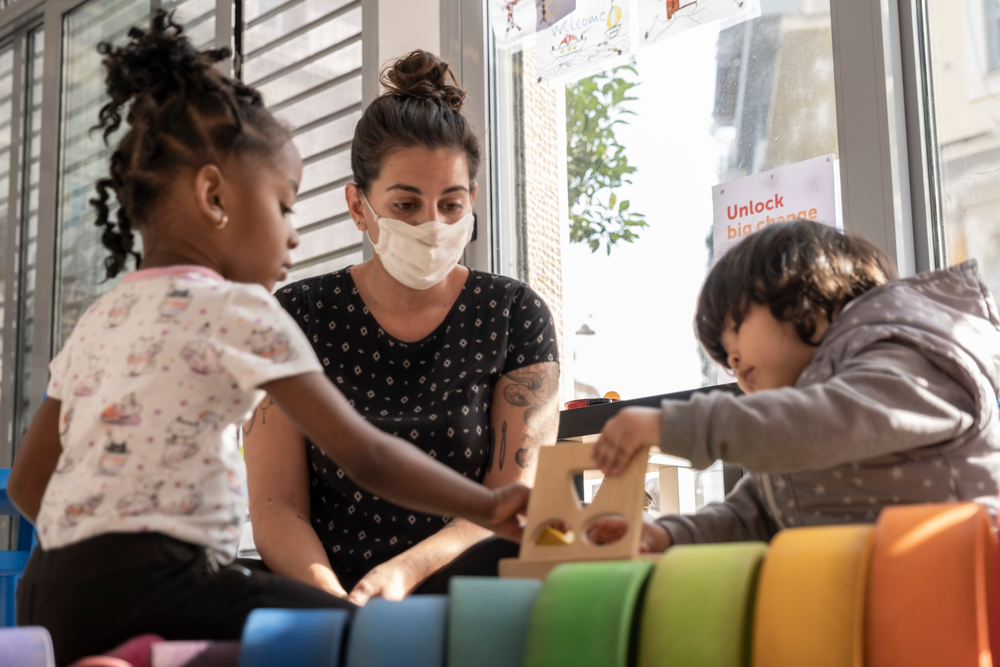Why the world needs to spend much more on early childhood education

Early childhood development, Global Youth Ambassadors
Theirworld wants the Transforming Education Summit to result in three major actions - here we spotlight the need for increased investment in the under-fives.
The background
Theirworld and our 2,000 Global Youth Ambassadors are calling for three major actions at the historic Transforming Education Summit, which begins tomorrow.
Based on consultations with youth and education experts, we want governments and donors to commit to:
- Invest 10% of all education funding in early childhood education
- Invest at least 6% to 10% of humanitarian assistance in education for refugees and displaced people
- Launch the International Finance Facility for Education (IFFEd) as part of a new global finance plan to achieve education for all by 2030
In the final of our in-depth looks at the three asks, we turn the spotlight on to early years learning.

The summit
The Transforming Education Summit is being held during the United Nations General Assembly in New York. Tomorrow is the youth-led Mobilisation Day, when the voices and experiences of young people will be heard. The summit culminates on Monday, September 19 with Leaders Day, featuring UN Secretary-General António Guterres, heads of government and a special Youth Declaration, including young people’s voices and messages from Theirworld’s #LetMeLearn campaign.
The issue
One in 10 of the world’s population is under the age of five. The first few years of a child’s life are crucial, with 90% of a child’s brain developing by five. Quality early childhood education means a girl or boy is more likely to stay in school and have better learning outcomes. But…
In low-income countries, eight in 10 children are missing out on preschool learning, compared to one in 10 in the most developed countries.
The benefits of giving children the best start in life are economic as well as social. Research shows supporting early learning is the best investment a government can make.
Every $1
invested can lead to a return of as much as $17 for the most disadvantaged children.
Global Youth Ambassador Ann Mwaniki, 27, from Kenya, said: “Early childhood education is a key determinant of the holistic performance of a child and it is important to ensure that quality education is offered to all children.”
The challenges
In 2015, world leaders made a promise that by 2030 every child should receive a quality and inclusive education – including during the early years.
That pledge has not been fulfilled. The educational needs of millions of young children in the poorest countries continue to be ignored.
Governments in many developing countries don’t invest enough in pre-primary education. And less than 2% of all early childhood development aid from donors goes towards education. Theirworld wants to change that.
Global Youth Ambassador Hasibul Hasan founded an organisation to help thousands access early childhood education in Bangladesh. He said: “Almost 70% of children here don’t get the opportunity of pre-primary education. Many parents don’t seem to be aware about the importance of early childhood education.”
Our calls for action
Theirworld has been campaigning for increased investment in early years since 2016. That’s when we launched our first major campaign on early childhood education and development. #5for5 creatively made the case for early years investment through videos featuring comedians from several countries.
Watch a #5for5 campaign video from 2017
 Play/span>
Play/span>Video
In 2017, we published a series of reports that emphasised the concerning gap in funding for pre-primary education and development. We demonstrated that it lagged considerably behind other components such as health and nutrition.
In 2019, Theirworld launched a campaign led by our Global Youth Ambassadors. UNICEF and Education Cannot Wait, the fund for education in emergencies. We made a bold call for governments and organisations to individually aim for 10% of education funding to go to the under-fives, which would ensure two years of free pre-primary education for every child.
Progress and frustration
Aid to pre-primary education more than doubled between 2015 and 2020. But it was still only 1.2% of all aid to education. In 2020, aid for post-secondary education was 25 times higher than pre-primary education.
There have been steps forward. In 2019, UNICEF announced it would commit 10% of its education funding to early years. This move has also been backed by the World Bank, African Union, Global Citizen and the Africa Early Childhood Network.
Despite this, spending on pre-primary education remains perilously low.

Happiness and Nilia play happily at a Batyna Hub in Athens (Theirworld/Christos Tolis)
Proving the case
Theirworld has been involved in early years projects and advocacy on the ground, with a focus on Lebanon, Greece and Kenya.
In Greece, Theirworld partnered with the Amna Refugee Healing Network in the Heal Together project for refugee children. It promotes mental health through early learning and creative exercises such as arts and crafts and storytelling.
“They learn how to be together. They learn to play group games together, to be kind to each other,” said Shima, mother of Nilisa from Afghanistan. “A three-year-old kid can learn to be sociable, to be in a community, to play with other kids and cooperate with them.”
In Lebanon, the MyBestStart project sees Theirworld working with agencies to provide thousands of children, parents and teachers with tools and resources to provide valuable early childhood education.
Our focus in Kenya is to persuade decision-makers at national and local level to increase their spending on pre-primary to 10% of their education budgets. Global Youth Ambassadors wrote an open letter to Kenyan President Uhuru Kenyatta, which said: “We believe a day will come that every child will have equal access to quality education, starting from pre-primary.”
Other stories in this series
More news

African youth rise up to demand early years spending target is met
